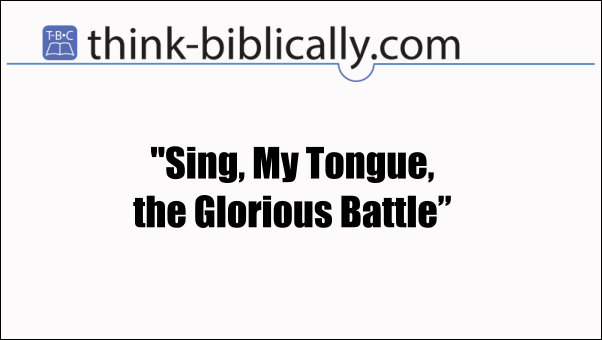By Tyson Thorne

Nearly 1500 years ago, in about 530 AD, a man was born initiallyand given the very Italian name of Venantius Honorius Clementianus Fortunatus. He served as a bishop in the early church, but before then he was a poet and hymnodist. As a man of words, he rose to remarkable heights and served many kings and rulers even at an early age. Imagine his dismay when he began to lose his sight. His vision darkened with terrifying swiftness. Being a man of faith, he prayed for healing, fasted frequently, and in a last ditch effort made a pilgrimage to Tours.
While in Tours he attended the cathedral of Saint Thomas, which is a bit ironic, really. Thomas was the disciple whose faith was limited to what he could see and touch. While at the cathedral he anointed his eyes with oil from the altar and, miraculously, his vision was restored. After graduating from the university of his day he was afforded many opportunities to serve royal families across the country, and even to defend those rulers of faith with his pen and made a lasting impact for Christendom at a time with the Roman empire was trying to rise again.
Among his many contributions to the church he wrote a hymn that has received little attention by modern Christianity, an oversight I would love to correct. If you are a worship leader, or know one, encourage the congregation this Sunday to sing Venantius' most stirring work (in my opinion), "Sing, My Tongue, the Glorious Battle". Hopefully it will inspire you during this holy week.
Sing; my tongue, the glorious battle,
sing the ending of the fray;
now above the cross, the trophy,
sound the loud triumphant lay:
tell how Christ, the world's Redeemer,
as a victim won the day.
Tell how, when at length the fullness
of th' appointed time was come,
Christ, the Word, was born of woman,
left for us his heavenly home;
showed us human life made perfect,
shone as light amid the gloom.
Thus, with thirty years accomplished,
went he forth from Nazareth,
destined, dedicated, willing,
wrought his work, and met his death.
Like a lamb he humbly yielded
on the cross his dying breath.
Faithful cross, thou sign of triumph,
now for us the noblest tree,
none in foliage, none in blossom,
none in fruit thy peer may be;
symbol of the world's redemption,
for the weight that hung on thee!
Unto God be praise and glory:
to the Father and the Son,
to th' eternal Spirit honor
now and evermore be done;
praise and glory in the highest,
while unending ages run.
